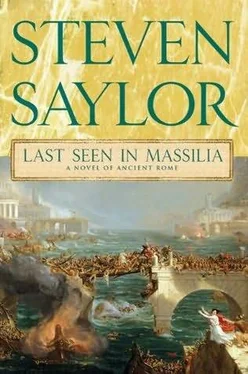Steven Saylor - Last seen in Massilia
Здесь есть возможность читать онлайн «Steven Saylor - Last seen in Massilia» весь текст электронной книги совершенно бесплатно (целиком полную версию без сокращений). В некоторых случаях можно слушать аудио, скачать через торрент в формате fb2 и присутствует краткое содержание. Жанр: Исторический детектив, на английском языке. Описание произведения, (предисловие) а так же отзывы посетителей доступны на портале библиотеки ЛибКат.
- Название:Last seen in Massilia
- Автор:
- Жанр:
- Год:неизвестен
- ISBN:нет данных
- Рейтинг книги:3 / 5. Голосов: 1
-
Избранное:Добавить в избранное
- Отзывы:
-
Ваша оценка:
- 60
- 1
- 2
- 3
- 4
- 5
Last seen in Massilia: краткое содержание, описание и аннотация
Предлагаем к чтению аннотацию, описание, краткое содержание или предисловие (зависит от того, что написал сам автор книги «Last seen in Massilia»). Если вы не нашли необходимую информацию о книге — напишите в комментариях, мы постараемся отыскать её.
Last seen in Massilia — читать онлайн бесплатно полную книгу (весь текст) целиком
Ниже представлен текст книги, разбитый по страницам. Система сохранения места последней прочитанной страницы, позволяет с удобством читать онлайн бесплатно книгу «Last seen in Massilia», без необходимости каждый раз заново искать на чём Вы остановились. Поставьте закладку, и сможете в любой момент перейти на страницу, на которой закончили чтение.
Интервал:
Закладка:
"So? Let them. They probably think I've come to throw myself off. They'd like that, I imagine; good luck for the fleet. But I've no intention of jumping. That would be premature. It's up to the priests of Artemis to choose the moment." He strode to the precipice and peered over. Davus and I stayed low but moved aside to make room. "It's been a long time since I was up here," he said. "It does give one a strange feeling."
A sudden, powerful gust of wind buffeted the rock. Hieronymus staggered. Davus and I both let out a gasp and reached to grip his ankles. He swayed but managed to brace himself. The flash of panic in his eyes was followed by a brittle laugh. "Our famous wind! It's starting early today. I wonder how it will affect the battle?"
"Hieronymus, sit down! It's not safe to stand."
"Yes, I think I will sit. But I won't lie flat, as you're doing. I've no reason to hide. Neither do you. You're with me now. You're with the scapegoat, and if the scapegoat chooses to sit cross-legged on his rock to watch the sea with his friends while we wait for news of the battle, who forbids it?"
"Unless my memory fails me, the First Timouchos forbids it, and quite explicitly."
"Apollonides!" Hieronymus snorted and waved his hand in the air, as if the dictates of the First Timouchos signified no more to him than the buzzing of a fly.
The scapegoat's presence on the rock continued to cause a commotion among the spectators along the battlements, but only for a short while. Eventually people grew tired of pointing and whispering. They knew that the Sacrifice Rock was sacred ground and they knew it was off-limits; but I suspect, like most people, they left the finer points of sacred law to the authorities in charge of such things. If the scapegoat himself should appear on the rock, for all they knew he was supposed to be there. They accepted his presence as part of the day's spectacle, as another of the rituals of battle-like the chanting that echoed from the temples-and they turned to watch the sea.
There was, however, nothing to watch. The last of the Massilian ships had vanished, sailing eastward up the coast. So had the last of the Roman fleet, sailing in pursuit. The battle, if there was to be one, would take place elsewhere, presumably off
Taurois, where the Pompeian relief fleet lay anchored. The spectators had nothing to look at but the empty sea, yet no one seemed inclined to abandon a hard-won spot along the wall. Sooner or later, a ship would appear. Would it be Massilian or Roman? The eyes of Massilia watched, dazzled by morning sunlight glinting off the waves, and waited.
From behind us, never ceasing, came the sound of chanting from the temples. It swelled or receded according to the whims of the wind that carried it to our ears. For long spells I took no notice and forgot about the chanting; then I would suddenly hear it again and realize it had never gone away. Chants to Artemis, chants to Ares, chants to a host of other gods competed for the ears of Olympus. Different chants echoed simultaneously through the city. Sometimes they clashed in dissonance. Sometimes, in rare, evanescent moments, they combined in accidental harmonies of unearthly beauty.
Like everyone else on the wall, we fell to discussing what was happening and what might happen next.
"It's what Apollonides and the Timouchoi have been waiting for, praying for-the arrival of these ships from Pompey," said Hieronymus. "Unless the blockade can be broken, it's only a matter of time until the city falls. Even if Trebonius can't break through the walls, starvation will do his work for him. The famine has started. Do you know, there's even talk of cutting my rations. My rations, the scapegoat's portion! That shows you just how badly things are going." On the wall not far away a child was crying persistently, probably from hunger. Hieronymus sighed. "You saw the fleets sail out, Gordianus. How many Massilian galleys did you count?"
"Eighteen, plus a number of smaller craft."
"And Caesar's galleys, how many of those did you count?"
"Eighteen as well."
"And word has it that the fleet from Pompey numbers eighteen vessels as well. No doubt the priests will find some mystical significance in these multiples of eighteen! But what it means in practical terms is that the combined Massilian and Pompeian ships outnumber those of Caesar two to one. A clear advantage that any gambler would appreciate! Except, of course, that we've already seen what happens when Massilian galleys run up against those of Caesar, even when Caesar's ships were built in a rush and manned by infantry-disaster for Massilia! Granted, Pompey's reinforcements should provide at least an even match… but why did their commander anchor at Taurois? Why didn't he sail straight to Massilia if his intention is to break the blockade? There's something not quite right about this so-called 'relief force. Do you know what I think? I think they're headed for Spain to join with the Pompeian navy there, and this stop in the vicinity of Massilia is no more than a courtesy call, to sniff the wind and see which way it's blowing. Oh, they'll render assistance to Massilia-as long as it's not too much bother. But what sort of fight are they going to put up when they see the kind of warriors they're up against and their own blood begins to color the sea red? Say, what's this?" From his pouch he produced another stuffed date, peered at it distastefully, then flung it into the sea. I heard a little moan from Davus, followed by the sound of his stomach growling.
"You may be right, Hieronymus," I granted. "But you may be wrong. I can imagine another scenario. The fleets do battle and Caesar's ships are destroyed. Why not? Pompey has officers every bit as clever as Caesar's, and fighting men who are just as brave. The blockade is broken. The Timouchoi regain control of the sea and the coastline. Trading vessels can come and go. The city's food stores are replenished; the famine is lifted. As long as the walls hold firm, Massilia can hold off Trebonius indefinitely. Or perhaps do better than that: If these eighteen ships from Pompey arrive in Massilia filled with soldiers, Domitius and Apollonides might even dare to mount a counterattack against Trebonius. Trebonius could be forced to retreat, might even be destroyed. If Massilia can be made into a secure stronghold for Pompey, then Caesar's route back to Italy would be blocked. He could be trapped in Spain. Meanwhile, Pompey could muster his forces in Greece and Asia, sail back to Italy to take on Marc Antony-"
"'Might'…'Could'…'What if?'" Hieronymus shook his head. "In a universe ruled by capricious gods, anything is possible. But close your eyes. What do you hear? A child crying because it's hungry. Apollonides and the Timouchoi are responsible for that. When Caesar came knocking at our gates, they made a choice-and they chose wrongly. That was the moment to seek the gods' wisdom. Now it's too late…"
So we spent the long day, talking politics and warfare. When those subjects paled, we moved on to others-our favorite Greek dramas and Roman comedies, the relative merits of various philosophers, the prose of Caesar compared to that of Cicero. Hieronymus delighted in being argumentative. Whatever side I took, he took the other, and usually got the better of me. To his advantage, he seemed freshly versed on every subject, like a schoolboy immersed in learning. In his role as scapegoat, his every pleasure had been catered to; books, denied him in his years as a beggar, were among those pleasures. Massilia was famous for its academies and had no shortage of books. They had been delivered to the scapegoat's house by the wheelbarrow-full. He had stuffed himself with scrolls just as he had stuffed himself with food.
Hours passed. The chanting from the temples never ceased. Davus contributed little to the conversation, except for an occasional grumble from his stomach. I grew hungry too, if the stirring of appetite experienced by a well-fed man when he goes without food for a few hours is worthy of being called hunger. How did it compare to what the spectators along the battlements were experiencing? In a city under siege, noncombatants always receive smaller rations than their defenders. Women, children, and the old are the first victims of famine, and the least able to withstand it. To what level of daily, hourly craving had the spectators around us already descended? How much thinner would they be stretched, and how much longer would they have to endure it? Truly starving people will eat anything to fill their bellies-wood shavings, the stuffing from pillows, even dirt. Hunger robs its victims of every shred of dignity before it snuffs out their lives. And for those who survive starvation, pestilence inevitably follows. Then surrender to the besieger; then rape, plunder, slavery…
Читать дальшеИнтервал:
Закладка:
Похожие книги на «Last seen in Massilia»
Представляем Вашему вниманию похожие книги на «Last seen in Massilia» списком для выбора. Мы отобрали схожую по названию и смыслу литературу в надежде предоставить читателям больше вариантов отыскать новые, интересные, ещё непрочитанные произведения.
Обсуждение, отзывы о книге «Last seen in Massilia» и просто собственные мнения читателей. Оставьте ваши комментарии, напишите, что Вы думаете о произведении, его смысле или главных героях. Укажите что конкретно понравилось, а что нет, и почему Вы так считаете.










